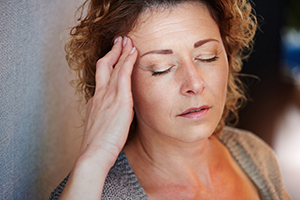Postural Orthostatic Tachycardia Syndrome (POTS) Treatment Specialist in Brooksville, FL

Do you feel dizzy, weak, or anxious upon standing up? Do chronic headaches, fatigue, shortness of breath, or blurred vision affect your daily routine and quality of life? You may be suffering from Postural Orthostatic Tachycardia Syndrome (POTS).
Postural Orthostatic Tachycardia Syndrome (POTS) is defined as an insufficient supply of blood returning to your heart when you stand up from a prone position. This condition causes blurred vision, dizziness, heart palpitations, weakness, and a number of other symptoms related to low blood pressure.
While the causes of this condition are poorly understood, many doctors believe it begins after pregnancy, major surgery, trauma, or a viral illness. POTS is also often confused with anxiety symptoms. Treatment is not specific to the individual, but centers on lowering your blood pressure and making lifestyle changes.
Don’t let POTS control your life. To speak with a POTS specialist in Brooksville, FL, call (813) 536-3212 or contact Erin Bolton online today.
What is Postural Orthostatic Tachycardia Syndrome?
There are several types of POTS conditions:
- Neuropathic POTS: the result of lost nerve supply leads to poor blood vessel muscles in the legs and core body
- Hyperadrenergic POTS: general overactivity of the sympathetic nervous system
- Low blood volume POTS: reduced or low blood volume causes symptoms similar to neuropathic and hyperadrenergic POTS, leading to overlapping symptoms
What are the symptoms of POTS?
POTS can be a difficult or even frightening experience, especially if it recurs daily.
Most POTS patients do not experience all symptoms but tend to suffer from two or more of these symptoms:
- feeling hot or cold
- anxiety
- cognition dysfunction (brain fog)
- blurry vision
- headaches
- insomnia
- disturbed sleep (waking with racing heartbeat, sweating, anxiety)
- shaking and tremors
- feet and hand discoloration
- exercise intolerance
- diarrhea or constipation
What causes POTS?
The causes for POTS are not known. These conditions can affect both men and women, though they occur more often in women between the ages of 15 and 50. However, the following diseases and medical conditions appear to stimulate POTS symptoms:
- anemia
- autoimmune diseases such as lupus or Sjogren’s syndrome
- diabetes and pre-diabetes
- infections like mononucleosis (mono), Lyme disease, or hepatitis C
- multiple sclerosis
- mitral valve prolapse
- changes in heart and blood vessel function
- impaired nerve function in certain muscles, especially in the legs and feet
- abnormal blood pressure regulation
POTS often begins after pregnancy, major surgery, trauma, or a viral illness. POTS does not appear to be a genetically inherited condition; however, some patients report a family history of this condition, suggesting genetic factors may play a role in developing POTS. Some studies point to the possibility that normal variations in certain genes may represent an increased risk of developing POTS.
How is POTS Diagnosed?
Generally, your doctor will identify POTS based on your description of symptoms and recommend additional testing to confirm the diagnosis. Common tests include measuring blood pressure and heart rate while you’re lying down, sitting, and standing.
Tilt table tests are also commonly used. This includes lying down on a moving table so your doctor can move you from a lying down to a standing position safely. Your heart rate and blood pressure are then checked for abnormal function.
POTS and anxiety
Very often, doctors will diagnose POTS as an anxiety-related disorder or some other type of mental health condition because anxiety symptoms so closely resemble POTS. Some practitioners might even diagnose certain POTs cases as psychosomatic—that is, symptoms which are imagined by the patient and not the result of an actual medical condition.
However, studies show that POTs isn’t simply caused by anxiety—it’s a very real condition that requires medical care and attention.
POTS is sometimes diagnosed as anxiety-related because its symptoms are very closely related to the physical effects of anxiety or panic attacks. It’s very important that you discuss all your symptoms and medical history with your doctor so you can get an accurate diagnosis. Don’t be afraid to get a second or even third doctor’s medical opinion regarding your condition.
| POTS symptoms | racing heartbeat dizziness or lightheadedness abdominal pain nausea chest pain shaking or tremors feeling hot or cold high or low blood pressure fainting chronic fatigue cognitive dysfunction (brain fog) blurry vision headaches insomnia disturbed sleep diarrhea or constipation exercise intolerance |
| Anxiety/panic symptoms | dizziness fear abdominal pain nausea chest pain shaking or tremors feeling hot or cold high or low blood pressure fainting headaches insomnia disturbed sleep |
How is POTS treated?
Currently, there is no definitive single treatment plan to relieve this condition. POTS treatment generally involves lowering your blood pressure and regulating circulatory problems that might be at the root of your symptoms.
Lifestyle changes may help reduce your symptoms. Your doctor may recommend that you:
- add salt to your diet: increasing sodium intake can help raise your blood pressure
- increase fluid intake: drinking more fluids can help regulate your blood pressure; 16 ounces of water before standing up is advisable
- get enough sleep: fatigue can aggravate POTS symptoms and make them harder manage
- exercise: reclined exercise such as biking or rowing may help regulate your heart rate and blood pressure without causing lightheadedness
How can I manage my POTS?
Doctors recommend keeping a symptom journal so you can identify and share your symptom triggers. For instance, you may experience symptoms before your period, when the weather is hot, or when you’re dehydrated. Sharing these triggers will help your doctor work out a treatment and lifestyle plan that best benefits you.
Coping strategy is a vital part of managing your chronic pain and conditions. Speaking with a therapist or other mental health professional about your symptoms may help you cope with POTS.
Request Your Appointment Today
Managing Postural Orthostatic Tachycardia Syndrome may be painful, difficult, and distressing. But you don’t have to manage POTS alone. Take the first step toward relief and understanding right now. To speak with a POTS specialist in Brooksville, FL, call (813) 536-3212 or contact Erin Bolton online today.
Evolution
Address
4691 Van Dyke RoadLutz, FL 33558
(813) 536-3212
www.evolution4health.com
Hours
Mon:
10:00 am - 4:00 pm
Tue:
10:00 am - 4:00 pm
Wed:
10:00 am - 5:00 pm
Thu:
10:00 am - 6:00 pm
Fri:
10:00 am - 3:00 pm
Sat:
Closed
Sun:
Closed


